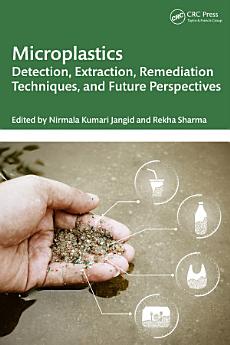Microplastics: Detection, Extraction, Remediation Techniques, and Future Perspectives
Acerca de este libro electrónico
Features:
- Discusses the presence of microplastics in matrices prone to human consumption.
- Includes general information on microplastics, their origin, types, shapes, size, and nomenclature.
- Reviews microplastics and numerous types of detection and extraction methods.
- Illustrates fundamental methods and techniques used for the remediation of microplastics.
- Explores the overall impacts of microplastics and their future perspectives.
This book is aimed at researchers, graduate students, and faculty members who can apply their knowledge in the emerging field of research on microplastic remediation. Despite our best efforts, mistakes and misconceptions may have occurred, for which we apologize. We welcome constructive criticism and suggestions to improve the presentation.
Acerca del autor
Dr. Nirmala Kumari Jangid works as an Assistant Professor of Chemistry at Banasthali Vidyapith, Banasthali (India). Her research focuses on materials chemistry, inorganic chemistry, and polymer chemistry (conducting polymers, and their functionalization for applications in photocatalysis, optoelectronics, sensing, etc.). She likes to work in interdisciplinary fields. She completed her Ph.D. in 2015 from the Department of Chemistry, Mohanlal Sukhadia University, Rajasthan, India. She recieved her master's in Organic Chemistry from the Mohanlal Sukhadia University, Rajasthan, India, and her bachelor’s degree from the University of Rajasthan, India. She has qualified for CSIR (Council for Scientific & Industrial Research) NET - JRF (National Eligibility Test-Junior Research Fellowship) in Chemical Sciences with All India Rank 73rd (June 2011). She has published over 3 patents, 15 peer-reviewed papers, 25 review articles, 30 book chapters, 10 chapters in encyclopaedia, an authored book, and edited 1 book. She has presented their research work at 15 international and national conferences. She is an active reviewer in more than 25 journals of international repute. At present, five students are doing their research work under her supervision.
Dr. Rekha Sharma received her B.Sc. from the University of Rajasthan, Jaipur, in 2007. In 2012, she completed her M.Sc. in Chemistry from Banasthali Vidyapith. She was awarded a Ph.D. in 2019 by the same university under the supervision of Prof. Dinesh Kumar. Presently, she is working as an assistant professor in the Department of Chemistry, Banasthali Vidyapith, and has entered a specialized research career focused on developing water purification technology. With 4 years of teaching experience, she has published 16 articles in journals of international repute, an authored book with CRC Press, and over 60 book chapters in the field of nanotechnology. She has presented her work at more than 15 national and international conferences. Dr. Sharma has reviewed many renowned journals including Science Direct, Trends in Carbohydrate Research, and Springer Nature. She has been recognized as a Young Women Scientist by the Department of Science and Technology (DST), Government of Rajasthan. Her research interests include developing water purification technology by developing biomaterial-reduced NPs and polymers and biopolymers, incorporating metal oxide-based nanoadsorbents and nanosensors to remove and sense health-hazardous inorganic toxicants like heavy metal ions from aqueous media for water and wastewater treatment.






